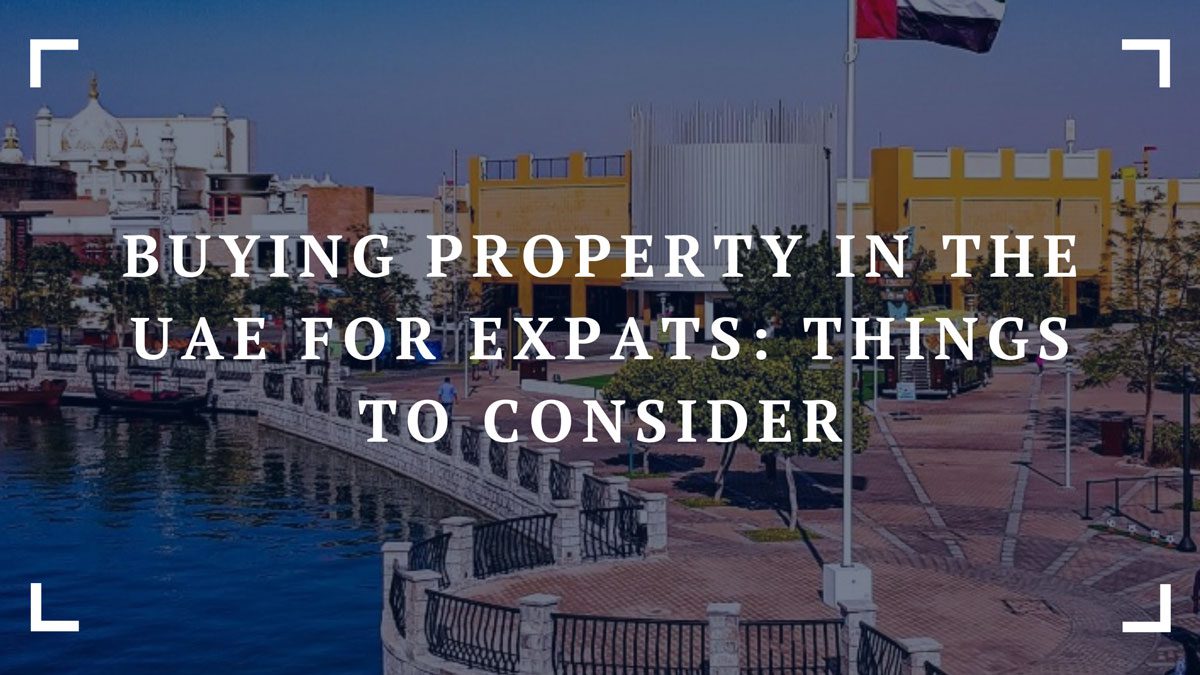With its world-class infrastructure, tax-free living, and sunny climate, it’s no wonder that the UAE real estate market is booming — it is anticipated to reach over $710 billion in value by the end of 2024. For expats, now is an ideal time to invest in Dubai property while the market is still experiencing growth.
In this article, you will learn about types of real estate and factors to consider when buying property as a foreigner in the UAE.

Key Considerations for Foreign Investors
If you are an expat looking to invest in UAE property, there are several key factors to keep in mind.
Legal Framework
The UAE allows foreign ownership of property, but there are regulations around it that you must understand. Only certain areas are designated as “freehold” properties that foreigners can fully own. Outside of freehold areas, you can own property under a 99-year leasehold. Buyers are required to pay a deposit of at least 10% of the property price to secure the property.

Developer Reputation
With many new projects launching across Dubai and Abu Dhabi, it’s essential to research developers thoroughly before investing. Look at their track record of completing high-quality projects on time. Well-known developers like Emaar, Damac, and Nakheel have built trust over many years in the market. Be wary of newer players with little history or reputation to uphold.
Exit Strategy
Have a plan in place for eventually exiting your investment. The UAE has a fairly liquid real estate market, especially in major metropolises like Dubai and Abu Dhabi.
Ideally, you want to invest in an area with a high possibility of strong resale value and demand. Also, consider the potential for capital appreciation and rental income. Ideally, your property should have strong prospects on both fronts.
Market Dynamics
Analyze current property values, rental yields, and the demand-supply situation. Look for areas where property values and rents are stable or rising and where there is a healthy demand for properties. The Dubai and Abu Dhabi real estate markets have seen strong growth over the past decade. For example, in Dubai, average residential prices rose by 20.1% in the year to December 2023. Properties in prime locations may hold value well.
With adequate due diligence on the legal framework, developer reputation, exit strategy feasibility, and current market dynamics, expat investors can successfully navigate the UAE’s real estate landscape. Seek expert guidance and weigh all factors carefully before committing to buy.
Spectrum of Property Types

As an expat in the UAE, there are two main types of properties to consider purchasing.
Freehold Property
Freehold property refers to land or buildings that you own indefinitely. As the owner, you have full property rights and can sell, lease, or occupy the property as you wish. The advantages of buying freehold property in the UAE as an expat include:
- Property inheritance. You can pass freehold property onto your heirs.
- Freedom of choice. As the owner, you have control over what happens to the property. You can live in it, rent it out, or sell it at your discretion.
- Plenty of options. There are freehold areas like Downtown Dubai and Dubai Marina open to foreign buyers across Dubai and the UAE.
Leasehold property
Unlike freehold, leasehold properties in the UAE are those where you purchase the right to live in or use the property for a fixed period, usually 99 years. The advantages of leasehold for expats are:
- No maintenance responsibilities. The freeholder or owner of the building handles exterior and shared area maintenance.
- Affordability. Leaseholds often cost significantly less upfront compared to freeholds. It allows more expats to enter the property market.
However, there are some downsides to be aware of with leasehold real estate Dubai offers. You will need permission from the freeholder before you can remodel or make structural changes.
Expenses to Anticipate When Purchasing Property in Dubai
One of the main costs to anticipate is property transfer fees. These are typically 2% to 4% of the total purchase price, and they go to the land department as a fee for officially transferring ownership. Make sure to factor this into your budget when deciding how much to spend on a property.
Property registration fees to cover the administrative costs of registering your ownership are around 4% of the purchase price. You may also need to obtain a no objection certificate (NOC).
While purchasing property as an expat in the UAE does come with some extra costs, being aware of these fees can help you create a realistic budget.
Summary
Foreigners can enrich their property investment portfolios and possibly experience significant financial gains in the UAE real estate market. But before diving into this market, one should know its rules, hidden expenses, and property options that will help you make the right move.


